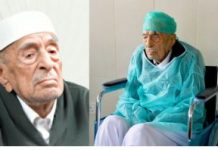ISLAMABAD, DEC 1 (APP): On World AIDS Day, a renowned expert Sunday stressed the need for public awareness and advocacy to change societal attitudes towards HIV/AIDS and emphasized the importance of heightened screening, particularly before marriages, to prevent the transmission of the disease.
In an interview with a private news channel, the expert said December 1 is World AIDS Day, a day to raise awareness about HIV/AIDS and honour the millions of people who have died from AIDS-related illnesses.
The theme for this year’s World AIDS Day is “Take the rights path: My health, my right” emphasizing the importance of protecting human rights and addressing inequalities to end the AIDS epidemic.
Dr AD Usmani, Head of AIDS Control in Quetta talking to a private news channel stressed the importance of promoting open discussions and inclusivity to ensure those affected receive necessary support and care.
By promoting pre-marital screening, individuals can make informed decisions about their health, reducing the risk of HIV transmission, he said, adding that addressing the stigma surrounding HIV/AIDS is also crucial, encouraging open discussions and promoting inclusivity to ensure those affected receive necessary support and care.
Usmani stressed that open discussion is crucial to breaking the taboo surrounding HIV/AIDS.
He emphasized that health authorities should launch awareness campaigns to educate people about
symptoms, causes and prevention of the disease.
Dr Usmani also urged couples planning to get married to undergo HIV testing, promoting a culture of transparency and precaution.
Usmani emphasized the crucial role of civil society, academia, and media in educating the public on HIV/AIDS prevention.
By working together, these entities can amplify awareness campaigns, promote accurate information, and encourage open discussions about the disease.
Civil society organizations can mobilize communities, provide support to affected individuals, and advocate for policies that promote HIV/AIDS prevention.
Academia can contribute by conducting research, developing evidence-based prevention strategies and providing educational resources. Media outlets can disseminate accurate information, raise awareness about prevention methods, and provide a platform for open discussions.
Effective collaboration among these stakeholders is essential to promote behavioural change, reduce stigma, and encourage people to take proactive steps in preventing HIV/AIDS.
By leveraging their collective strengths, civil society, academia, and media can play a vital role in combating the disease and promoting public health, he added.

















